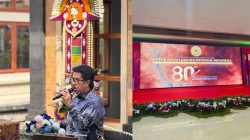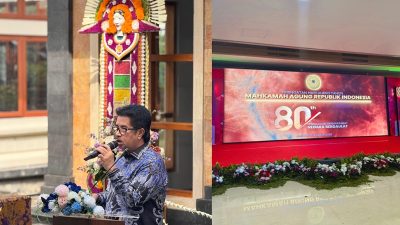Indonesiantalk.com — Java Jazz: More Than a Festival, A Cultural Milestone
Java Jazz is not merely an event. It is a cultural milestone—an enduring testament to how dreams, when nurtured with love and persistence, can shape a nation’s artistic legacy.
The 2025 Java Jazz Festival press conference was unlike any other. This year’s gathering wasn’t just a stage to announce line-ups or headline surprises. It carried a different weight—more personal, more reflective. It felt like a pause amidst the noise of the entertainment industry. A moment to look back at the roots from which it all began.
When Dewi Gontha, President Director of Java Festival Production, stepped forward to open the event, the room instantly fell silent. With a restrained voice and visible emotion, she passed the opening moment to her father, Peter F. Gontha—the visionary behind the Java Jazz Festival.
“Since this marks our 20th edition, if I may, I would like to invite my father onstage to say a word or two,” Dewi said gently.
And when Peter took the stage, he didn’t introduce himself as a businessman, diplomat, or media icon. Instead, he called himself a dreamer—a man who once believed that Indonesia could host a world-class jazz festival, and then set out to make it happen.
“Today is deeply emotional and joyful for me personally, and perhaps for every jazz lover in Indonesia,” Peter said, recalling the year 2005—when the idea of Java Jazz was still considered too ambitious.
But Peter’s conviction never wavered. He believed Indonesia held the spirit, the talent, and the collective soul to turn a dream into reality.
And much like jazz itself—born from collaboration, spontaneity, and the courage to explore—Java Jazz was never built alone.
In the spirit of commemorating this two-decade journey, Peter F. Gontha launched a new book titled The Making of Java Jazz Festival. Spanning 506 pages and published in English, the exquisitely designed book is not just a historical archive—it is a love letter. A tribute to music, to Indonesia, and to everyone who believed in the dream from the beginning.
“Over 20 years, there have been sweat, pressure, crises, and tears,” Peter shared. “But stronger than all of those is love. Love for music, love for Indonesia, and love for our shared dreams.”
From the press conference stage, Peter presented a copy of the book to SS Budi Rahardjo, Editor-in-Chief of MATRA Magazine and CEO EKSEKUTIF magazine, as a symbolic gesture of gratitude to the media—who, in his words, have not merely covered the festival, but have become the heartbeat of its spirit.
The book will be distributed for free to media partners, collaborators, and sponsors in appreciation of their trust, cooperation, and loyalty throughout these two decades.
For Peter, sponsors are not merely financial backers; they are cultural partners. Their support proves that art and business can move hand in hand in the effort to build a nation.
The festival, Peter emphasized, is a product of collective work—from the silent partners and the enthusiastic media to the volunteers and production teams who serve as the backbone behind the scenes. Java Jazz is a stage of memories, a space of encounters, and a celebration of soul.
Within the pages of the book, readers are taken through fragmented memories: stories from the legendary Jamz Club in Blok M, the evolving yearly themes, and the many individuals who have left their mark on Java Jazz’s storied stage.
There are also deeply personal reflections—how Peter fell in love with jazz as a teenager, how he connected with Jakarta’s vibrant music community, how his love for his wife Purnama shaped his journey, and how he now passes the torch to his daughter Dewi.
“Java Jazz is an expression of gratitude and respect. One of which is to my father, who first introduced me to music,” Peter said, his voice trembling with emotion.
More than a festival, Java Jazz is a cultural movement. It brings together local and international musicians, merges nostalgia with new explorations, and acts as a bridge between the past and the future. In every harmony, there is memory. In every melody, there is hope.
And in 2025, Java Jazz not only marks its 20th anniversary—it reaffirms a powerful truth: dreams, when guarded with love, will live on. And from Jakarta, the sound of jazz will continue to resonate—not merely as music, but as a way of feeling, breathing, and loving the world.














